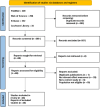Does diabetes status modify the association between the triglyceride-glucose index and major adverse cardiovascular events in patients with coronary heart disease? A systematic review and meta-analysis of longitudinal cohort studies
- PMID: 40760488
- PMCID: PMC12323116
- DOI: 10.1186/s12933-025-02890-7
Does diabetes status modify the association between the triglyceride-glucose index and major adverse cardiovascular events in patients with coronary heart disease? A systematic review and meta-analysis of longitudinal cohort studies
Abstract
Background: The triglyceride-glucose (TyG) index, a surrogate marker for insulin resistance, has been shown to be closely associated with cardiovascular risk. However, it remains unclear whether diabetes status affects the association between the TyG index and the risk of major adverse cardiovascular events (MACEs) in patients with coronary heart disease (CHD). The aim of this study is to systematically evaluate the relationship between the TyG index and MACEs among CHD patients with different diabetes statuses.
Methods: We systematically searched PubMed, the Cochrane Library, Web of Science, and Embase from inception to March 13, 2025, for cohort studies examining the association between TyG and MACEs in patients with CHD with different diabetes statuses. The outcomes included all-cause mortality, nonfatal myocardial infarction, nonfatal stroke, and revascularization. Hazard ratios (HRs) and 95% confidence intervals (95% CIs) were extracted for the TyG index as both categorical and continuous variables. Study quality was assessed using the Newcastle-Ottawa Scale (NOS). All the statistical analyses were performed using Stata (version 17.0) and R (version 4.4.1). Depending on heterogeneity, either a fixed-effect or random-effects model was used to pool the data. Subgroup analysis and meta-regression are used to explore the sources of heterogeneity. This study was registered in PROSPERO (CRD: 420251018545).
Results: A total of 36 longitudinal cohort studies comprising 173,851 participants (119,232 with diabetes and 54,619 without diabetes) were included, with 9159 MACEs reported during the follow-up period. In diabetic patients, a higher TyG index significantly increased the risk of MACEs (categorical HR = 1.98, 95% CI 1.61-2.43; continuous HR = 1.57, 95% CI 1.38-1.78), all-cause mortality (HR = 1.74, 95% CI 1.45-2.08), nonfatal myocardial infarction (HR = 2.05, 95% CI 1.52-2.77), nonfatal stroke (HR = 1.73, 95% CI 1.12-2.66), and revascularization (HR = 2.52, 95% CI 1.26-5.04). In nondiabetic patients, a higher TyG index also significantly increased the risk of MACEs (categorical HR = 1.65, 95% CI 1.33-2.05; continuous HR = 1.74, 95% CI 1.46-2.06), all-cause mortality (HR = 1.50, 95% CI 1.18-1.90), nonfatal myocardial infarction (HR = 2.46, 95% CI 1.11-5.47), and revascularization (HR = 2.09, 95% CI 1.57-2.76). However, no association was observed between the TyG index and nonfatal stroke (HR = 1.66, 95% CI 0.88-3.12) in nondiabetic patients.
Conclusion: Higher TyG index values appear to be associated with an increased risk of adverse cardiovascular events, all-cause mortality, nonfatal myocardial infarction, and revascularization in both diabetic and nondiabetic patients with CHD. However, no significant association was found between the TyG index and the risk of nonfatal stroke in nondiabetic patients. These findings suggest that the TyG index may offer potential prognostic value in CHD, but further high-quality prospective studies are warranted to confirm these associations and clarify their clinical implications.
Keywords: Coronary heart disease; Diabetes; Major adverse cardiovascular events; Meta-analysis; Triglyceride‒glucose index.
© 2025. The Author(s).
Conflict of interest statement
Declarations. Ethics approval and consent to participate: Not applicable. Consent for publication: Not applicable. Competing interests: The authors declare no competing interests.
Figures








Similar articles
-
Association of prediabetes and insulin resistance on prognosis of patients with moderate-to-severe coronary artery calcification: a prospective cohort study.Cardiovasc Diabetol. 2025 Jul 2;24(1):262. doi: 10.1186/s12933-025-02807-4. Cardiovasc Diabetol. 2025. PMID: 40604950 Free PMC article.
-
Triglyceride-glucose index as a predictor of cardiac adverse events in acute coronary syndrome patients undergoing percutaneous coronary intervention: role of diabetes.BMC Cardiovasc Disord. 2024 Sep 27;24(1):514. doi: 10.1186/s12872-024-04191-5. BMC Cardiovasc Disord. 2024. PMID: 39333881 Free PMC article.
-
Effects of a gluten-reduced or gluten-free diet for the primary prevention of cardiovascular disease.Cochrane Database Syst Rev. 2022 Feb 24;2(2):CD013556. doi: 10.1002/14651858.CD013556.pub2. Cochrane Database Syst Rev. 2022. PMID: 35199850 Free PMC article.
-
Does diabetes modify the triglyceride-glucose index associated with cardiovascular events and mortality? A meta-analysis of 50 cohorts involving 7,239,790 participants.Cardiovasc Diabetol. 2025 Jan 27;24(1):42. doi: 10.1186/s12933-025-02585-z. Cardiovasc Diabetol. 2025. PMID: 39871273 Free PMC article.
-
Association between insulin resistance indices and outcomes in patients with heart failure with preserved ejection fraction.Cardiovasc Diabetol. 2025 Jan 22;24(1):32. doi: 10.1186/s12933-025-02595-x. Cardiovasc Diabetol. 2025. PMID: 39844150 Free PMC article.
References
-
- Wang S, Zhang X, Keerman M, Guo H, He J, Maimaitijiang R, Wang X, Ma R, Guo S. Impact of the baseline insulin resistance surrogates and their longitudinal trajectories on cardiovascular disease (coronary heart disease and stroke): a prospective cohort study in rural China. Front Endocrinol (Lausanne). 2023;14:1259062. - PMC - PubMed
Publication types
MeSH terms
Substances
LinkOut - more resources
Full Text Sources
Medical

